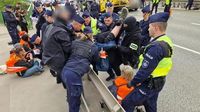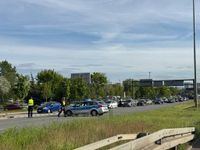On May 7, 2025, activists from the environmental group Ostatnie Pokolenie (Last Generation) executed a blockade on the Siekierkowski Bridge in Warsaw, significantly disrupting traffic and drawing attention to their demands for public transport reform. This action marks the third day of protests organized by the group, which has been vocal about its stance against the Polish government's transportation policies.
The blockade began around 4 PM, with several activists gluing themselves to the asphalt and sitting on the road, holding banners that read "Trzaskowski poprzyj postulaty" (Trzaskowski support the demands) and "Tania kolej, nie autostrady" (Cheap rail, not highways). As a result, traffic towards Praga was completely halted, while vehicles moving in the opposite direction continued to flow normally. The police were present at the scene, directing drivers to detours on Idzikowskiego Street before reaching the bridge.
According to the police, the disruptions have been ongoing since the afternoon, leading to a significant traffic jam that extended back to Stegny. Many frustrated drivers expressed their discontent, leading to verbal altercations between them and the protesters. Some drivers attempted to navigate their vehicles between the activists, exacerbating the situation. The police reported that while many protesters were removed from the road, a couple remained glued in place, making their removal challenging.
This blockade is part of a broader campaign by Ostatnie Pokolenie, which has been escalating its protests throughout the week. On May 5, the activists blocked three major bridges in Warsaw: Śląsko-Dąbrowski, Świętokrzyski, and Poniatowski, coinciding with the start of the matura exams. Activists walked slowly across these bridges in orange vests, carrying Polish flags and banners advocating for their cause. Their protest on that day culminated in activists gluing their hands to the road, which required police intervention using acetone and other tools to detach them.
On the following day, May 6, they shifted their focus to Słomińskiego Street near the Gdańsk Railway Station, where they again glued themselves to the road, causing traffic disruptions. The police struggled to remove those who had used strong adhesives, and assistance from firefighters was called upon to help with the situation.
Ostatnie Pokolenie has made two primary demands: the reallocation of funds from highway construction to regional and local public transport and the introduction of a monthly ticket priced at 50 złoty for regional and local travel. The group claims that these changes are essential to combat climate change and to provide equitable transport solutions for rural and underserved areas of Poland.
Julia Keane, a spokesperson for Ostatnie Pokolenie, emphasized the urgency of their demands, stating, "If Rafał Trzaskowski wants to be the president of all Poles, why doesn’t he decide to talk to us for the good of the people? This is a test for him as a future president. He can still accept the demands of Ostatnie Pokolenie, and then the protests will cease." The activists expressed their frustration over what they perceive as the mayor's indifference to their calls for action.
In a recent statement, Ostatnie Pokolenie outlined their ultimatum to Trzaskowski, demanding public support for their transportation proposals and a meeting with Prime Minister Donald Tusk. They had given Trzaskowski until May 4 to respond, but with no action taken, they proceeded with the blockade on May 7. They believe that their protests will continue until their voices are heard and their demands are met.
In addition to the bridge blockades, Ostatnie Pokolenie has engaged in other forms of protest, including splashing paint on the Smoleńsk monument on April 9, 2025, as a symbolic act of defiance against the government's inaction regarding climate issues. These actions have drawn both support and criticism from various segments of the public.
The police have been actively managing the situation, advising drivers to remain patient and to follow their directions. As the protests continue, the impact on public transport has been significant, with several bus routes being diverted due to the blockades. The operation of bus stops near the Siekierkowski Bridge has also been temporarily suspended.
Ostatnie Pokolenie’s commitment to their cause is evident in their plans for future protests, which they intend to carry out until they achieve their goals. The group aims to raise awareness about the urgent need for a shift in transportation policy, emphasizing that their proposed changes are not just about convenience but are crucial for addressing broader environmental concerns.
As the situation unfolds, it remains to be seen how the city’s leadership will respond to the activists’ demands and whether a dialogue can be established to address the pressing issues surrounding public transport and climate change in Poland.
For now, the protests serve as a stark reminder of the growing frustration among citizens regarding environmental policies and the need for sustainable solutions in urban planning.






